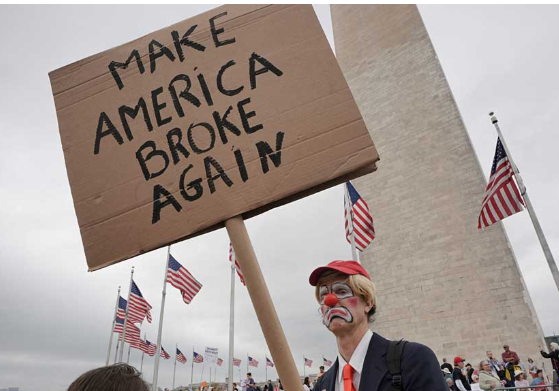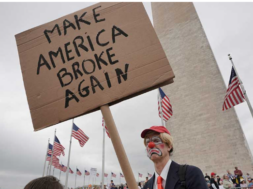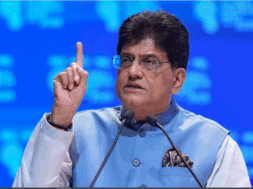
Roving Periscope: Despite Trump’s tariffs, India to push growth story ahead
Virendra Pandit
New Delhi: While some economists insist that the Trump tariffs could slow down India’s growth by 20 to 40 basis points in 2025-26 amid the ongoing global disruptions, the Union Finance Ministry believes India is likely to meet its projected growth target of 6.3 percent to 6.8 percent in FY26,
The higher tariff rates, ranging between 10 and 49 percent, affecting nearly 100 countries, are set to be collected beginning Wednesday, ushering in a new era of economic uncertainty with no clear end in sight.
A media outlet, quoting a financial ministry official, said the comments come as a trade war, triggered by US President Donald Trump’s tariffs on trading partners, shakes global markets with major stock indices plunging in Asia on Monday.
Experts said Trump’s tariffs could slow India’s growth by 20-40 basis points in the ongoing financial year and may cripple sectors like India’s diamond industry, which ships more than a third of its exports to the US, putting at risk thousands of jobs.
Another officer said the tariff announcements will not weigh heavily on India’s key fiscal parameters in the current financial year.
India is open to taking more measures to assist exporters impacted by higher US tariffs. “We have already made provisions in the budget for duty remission schemes to help exporters and are open to doing more,” the official said.
As of now, India does not plan to retaliate against Trump’s 26 percent tariff on imports from the South Asian nation as talks for a deal between the countries progress.
On his part, President Trump said on Sunday that he won’t back down on his sweeping tariffs on imports from most of the world unless countries even out their trade with the US, digging in on his plans to implement the taxes that have sent financial markets reeling, raised fears of a recession and upended the global trading system.
Speaking to reporters aboard Air Force One, he said he didn’t want global markets to fall, but also that he wasn’t concerned about the massive sell-off either, adding, “sometimes you have to take medicine to fix something.” His comments came after his aides sought to soothe market concerns by saying more than 50 nations had reached out about launching negotiations to lift the tariffs.
“I spoke to a lot of leaders, European, Asian, from all over the world,” Trump said. “They’re dying to make a deal. And I said, we’re not going to have deficits with your country. We’re not going to do that, because to me a deficit is a loss. We’re going to have surpluses or at worst, going to be breaking even.”
US Treasury Secretary Scott Bessent said unfair trade practices are not “the kind of thing you can negotiate away in days or weeks.” The US, he said, must see “what the countries offer and whether it’s believable.”
Trump, who spent the weekend in Florida playing golf, posted online that “WE WILL WIN. HANG TOUGH, it won’t be easy.” His Cabinet members and economic advisers were out in force on Sunday defending the tariffs and downplaying the consequences for the global economy.
“There doesn’t have to be a recession. Who knows how the market is going to react in a day, in a week?” Bessent said. “What we are looking at is building the long-term economic fundamentals for prosperity.”
US stock futures dropped on Sunday evening as the tariffs continued to roil the markets. Dow Jones Industrial Average and S&P 500 futures fell nearly 4 percent while Nasdaq futures were down nearly 5 percent. Even the price of bitcoin, which held relatively stable last week, fell nearly 6 percent on Sunday.
Trump’s tariff blitz, announced on April 2, fulfilled a key campaign promise as he acted without US Congress to redraw the rules of global trade. It was a move decades in the making for Trump, who has long denounced foreign trade deals as unfair to the US. He is gambling that voters will be willing to endure higher prices for everyday items to enact his economic vision.
Countries are scrambling to figure out how to respond to the tariffs, with China and others retaliating quickly.
Top White House economic adviser Kevin Hassett acknowledged that other countries are “angry and retaliating,” and, he said, “by the way, coming to the table.” He cited the Office of the US Trade Representative as reporting that more than 50 nations had reached out to the White House to begin talks.
Adding to the turmoil, the new tariffs are hitting American allies and adversaries alike, including Israel, which is facing a 17 percent export duty. Israeli Prime Minister Benjamin Netanyahu is set to visit the White House and speak at a press conference with Trump on Monday, with his office saying the tariffs would be a point of discussion with Trump along with the war in Gaza and other issues.
Another American ally, Vietnam, a major manufacturing hub for clothing, has also been in touch with the administration about the tariffs. Trump said Vietnam’s leader said in a telephone call that his country “wants to cut their tariffs down to ZERO if they are able to make an agreement with the U.S.”
And a key European partner, Italian Premier Giorgia Meloni, said she disagreed with Trump’s move but was “ready to deploy all the tools — negotiating and economic — necessary to support our businesses and our sectors that may be penalized.”
US Commerce Secretary Howard Lutnick, however, made clear there was no postponing tariffs.
“The tariffs are coming. Of course they are,” he said, adding that Trump needed to reset global trade. But he committed only to having them “definitely” remain “for days and weeks.” In US Congress, where Trump’s Republican Party has long championed free trade, the tariff regiment has been met with applause but also significant unease.
Several Republican senators have already signed onto a new bipartisan bill that would require presidents to justify new tariffs to Congress. Lawmakers would then have to approve the tariffs within 60 days, or they would expire. Nebraska GOP Rep. Don Bacon said Sunday that he would introduce a House version of the bill, saying that Congress needs to restores its powers over tariffs.
“We gave some of that power to the executive branch. I think, in hindsight, that was a mistake,” said Bacon, adding that getting a measure passed would be challenging unless the financial markets continue to react negatively and other indicators such as inflation and unemployment shift.
Wyoming’s John Barrasso, the No. 2 member of the Senate’s GOP leadership, said Trump is “doing what he has every right to do.” But, he acknowledged, “there is concern, and there’s concern across the country. People are watching the markets.” “There’ll be a discussion in the Senate,” Barrasso said of the tariffs. “We’ll see which way the discussion goes.”














